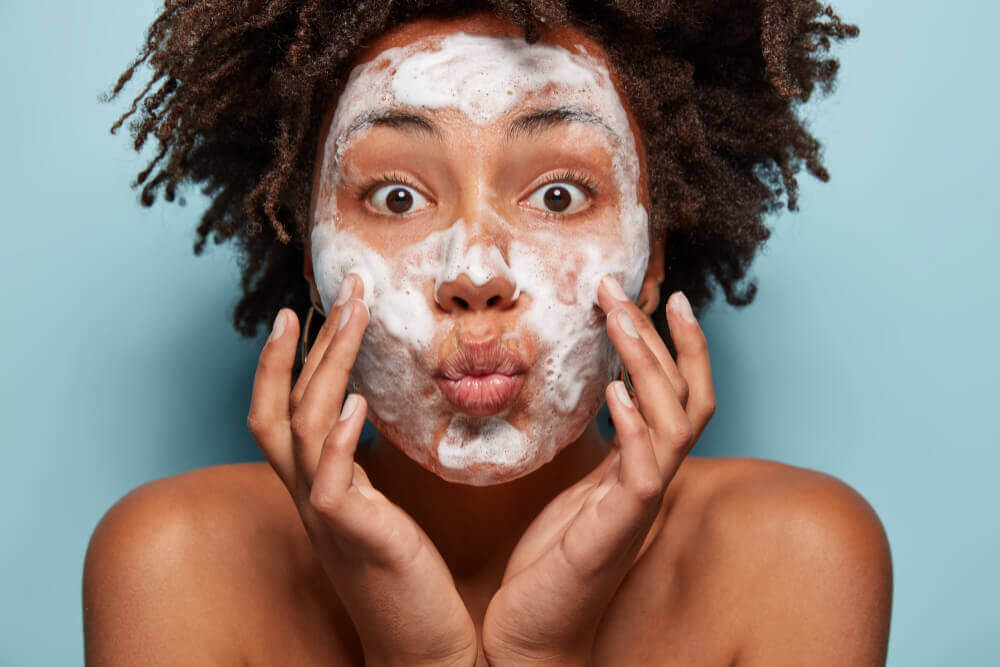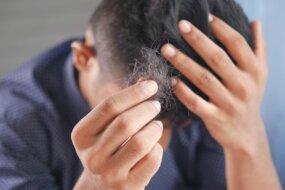
Now that you’ve spent some time enhancing your skin’s wellbeing and providing it with the resources it requires to repair itself, you can focus on developing the best possible maintenance schedule. Keep in mind that habits are formed in three to four weeks. Start with what you know you can stick to for three weeks. If that means only focusing on your skincare routine for a month, then your hair care routine, that’s great. Just don’t forget about your foundational routine for better nutrition, hydration, and rest!
Let’s start with Understanding Your Skin Type
First and foremost, you must understand your skin type in order to choose skincare items that are appropriate for you. Are you blessed with average, dry, dehydrated, oily, mature, or sensitive skin?
Dry Skin (Skin that is dry or very dry)
Products with a high percentage of cream and oil are advantageous. Avoid using soap or detergent-based products on your face and neck because they can be drying. Soothing and hydrating oil-based face masks are ideal for dry skin.
Dehydrated Skin
To stay hydrated, drink plenty of water, aiming for 2 liters a day.
Oily Skin
Cleansing and moisturising milk or lotions for oily skin have higher water content and a lighter consistency, making them less likely to cause congestion. Excessive exfoliation of the skin may cause an increase in oil production.
Combination Skin
Treat the various areas of the face with items tailored to their needs. Light formulations, for example, in the oilier T Zone region, and richer creamier products in the dry zones. A hydrating mask for the cheeks and a deep cleansing mask for the forehead, nose, and chin will support the face.

Care for Mature Skin
Choose richer creamier oil-based items, as you would for dry skin. Since the skin can be thin or have damaged capillaries, it should be handled with extreme caution and minimal pressure. Firming and anti-aging products, as well as unique neck and eye care products, are extremely helpful.
Tips for Sensitive Skin
Not only is sensitive skin more likely to respond to product ingredients, but it is also more susceptible to the harmful effects of the sun. It is recommended that you use a sunscreen with an SPF of at least 50. An exfoliating scrub is harsher on the skin than a soft peeling product that does not contain granules.
What kind of facial therapy products are available now that we’ve discussed various skin types, and what can they do for your skin?
A cleanser for the Face
These remove make-up and leave the skin clean and clear of impurities. Some cleansers are soft enough to use around the eyes, but if you wear waterproof mascara, you’ll need an eye makeup remover.
Lotion for Toning
These remove cleanser residue, refresh the skin, and have a temporary tightening effect on the pores. Refreshes the skin and aids in the restoration of the skin’s PH.
Moisturiser
They nourish the skin, leaving it soft and smooth, and are commonly referred to as day creams or hydrating lotions. Emulsions of oil and water draw water to the skin and avoid moisture loss by evaporation. After cleansing and toning, apply moisturiser to the skin. SPF is used in some moisturising creams and lotions, which helps protect the skin from environmental damage. Moisturizers not only hydrate and prepare the skin, but they also serve as an outstanding foundation for makeup application.
Creams for the Eyes
Face creams are specially formulated to hydrate and protect the fragile skin around the eyes. They often include collagen, oils, and vitamins, and some also have light-diffusing particles to help draw focus away from dark circles under the eyes.
Neck Lotions
Neck firming and moisturising creams are more hydrating than regular moisturisers. The normal moisturiser is normally adequate to nourish the neck and décolletage in our 20s and 30s, but by our 40s and beyond, the neck also needs more intensive hydration. The additional benefits of collagen and elastin are thought to help avoid sagging and ageing, resulting in a more youthful look.
Exfoliation (is the process of removing dead skin cells from)
Exfoliating creams or gels contain tiny particles that gently scrub the skin, removing dead skin and exposing healthy, new skin underneath. They help strengthen and avoid breakouts by loosening surface blockages and giving a healthy glow to previously tired-looking complexions. Exfoliators are excellent for evening out a fading tan.
As your skin grows and repairs itself, the outer layer of dead cells slough off. To expedite this process and get to the fresher, newer cells below, it’s recommended that you exfoliate your skin at least once a week. There are basically two ways of doing this, mechanically and chemically. For mechanical exfoliation, you can use a good skin scrub, a microdermabrasion cream or a loufah pad. Chemically, you can use one of the common acidic exfoliating preparations, glycolic acid peels, lactic acid peels, alpha-hydroxy, etc. Some skin cleansers come with this step built right inside the formula. Your skin type will determine how often you should exfoliate and which method you should use. Irritated skin, like that with acne, eczema or rosacea will not appreciate the heavy scrubbing of mechanical exfoliants, and even a chemical formula may be too irritating for more than occasional use. Older skin that is highly sun-damaged may require either or both methods, perhaps more often, to remove the layers of damaged skin and help stimulate the production of healthy collagen structures in the deeper layers of the skin. Again, we’ll show you how to determine how often and which method of exfoliation will work best for you.
Face Masks
There are numerous formulations of face masks available, each of which performs a different function. Facial masks are a soothing and calming addition to every skin care regimen. They boost the overall colour of the skin and increase circulation.
A deep cleaning mask removes dirt, waste, and oil that has become stuck. They have a light exfoliating effect. Dry, flaky skin is replaced with fluffy, smooth skin. Toning and refining masks provide relief to sore skin. The skin is revitalised and revitalised, and pores appear smaller, resulting in a more polished complexion. Soothing moisturising ingredients in nourishing and hydrating masks hydrate the skin, leaving it soft and smooth. They even help to rejuvenate tired-looking skin.
Sunscreens and Sunblocks
A facial sunscreen is a must-have beauty product for the entire year. Choose one with at least an SPF of 15. Even on cloudy days, the sun’s rays reach the atmosphere, and the harmful effects on the skin build up over time, resulting in pigmentation and premature ageing. In more severe cases, this can result in sunburn and permanent scarring.






